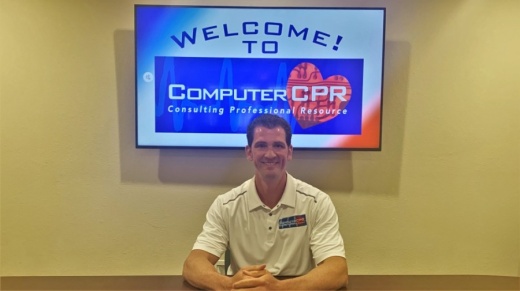The business has grassroots beginnings, according to Young. He would spend hours marketing himself in the community.
“I would literally run ... to fix [a] computer, and if there was any daylight left, [I’d] be back out hanging flyers,” he said. “I hustled a lot.”
Since he opened Computer CPR in January 2007, Young has had to work to keep up with developing technologies, which he said is “a constant challenge.”
But the company has adapted to serve a variety of tech needs, including IT services, computer repair, data recovery and remote tech support.
“There’s wisdom from years of making mistakes ... and doing things wrong,” he said.
As digital workspaces have become the norm for daily business operations, Computer CPR has shifted its model to focus on small-business IT support in addition to its regular IT services. One of the biggest needs the company addresses is cybersecurity.
“Cybersecurity is very important whenever you have a group of individuals that are working together over the internet,” Young said. “To have an office properly operating [is to make sure] they’re not just completely flying unprotected.”
The evolution of technology means Young’s business has to constantly stay ahead of new developments in the field to ensure Computer CPR can respond to its clients’ needs.
“[We will] continue to respond to the newer technologies that come out to make sure that we’re equipped to support them,” Young said. “We’re a responsive business, ... [and we’re] aggressive with staying caught up.”
HOW TO PROTECT YOUR COMPUTER
Michael Young, founder of Computer CPR, shared these tips for protecting yourself and your online data from hackers and malware.
1. Have an antivirus subscription. Computer viruses are malicious programs that can result in slow computer performance, erratic computer behavior, unexplained data loss and frequent computer crashes.
2. Make sure your operating system is up to date. A computer’s operating system helps run programs, and having the most current version ensures that your computer is compatible with new programs.
3. Beware of suspicious emails. Spam and malicious emails are common ways that hackers try to steal your information. Some emails may impersonate family members or coworkers to get you to open a file or link. Always check where the email is from and whether the contents of the email are expected and are from reliable sources.
Computer CPR is located at 469 Cherry Lane, Southlake. Phone: 817-915-0111 Website: www.computercpr.com Hours: Mon.-Fri. 9 a.m.-6 p.m., closed Sat.-Sun.





